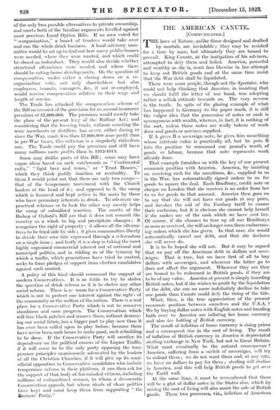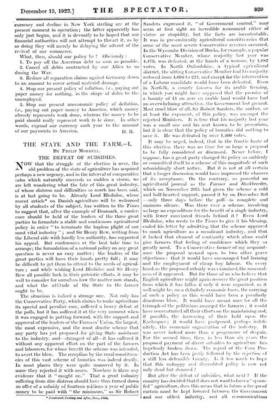T HE laws of Nature, unlike those designed and drafted by
mortals, are inviolable ; they may be resisted for a time by man, but ultimately they are bound to prevail. King Canute, at the instigation of his advisers, attempted to defy them and failed. America, powerful and wealthy as she is, must fare likewise in her attempt to keep out British goods and at the same time insist that the War debt shall be liquidated.
There were some people, though not the Spectator, who could not help thinking that America, in insisting that we should fulfil the letter of bur bond, was adopting rather a selfish attitude towards us. The very reverse is the truth. In spite of the glaring example of what has happened in Germany to the paper mark, it is still the vulgar idea that the possession of notes or cash is synonymous with wealth, whereas, in fact, it is nothing of the sort, unless those notes are really tokens of work done and goods or services supplied.
If A gives B a sovereign note, he gives him something whose intrinsic value is practically nil, but he puts B into the position to command one pound's worth of goods or labour, because that note represents work already done.
That example furnishes us with the key of our present economic position with America. America, by insisting on receiving cash for the munitions, &c., supplied to us in the War, has automatically signed orders to us for goods to square the deal. Each Bradbury, credit note or cheque on London that she receives is an order from her to us for goods to that amount. America then goes on to say that she will not have our goods at any price, and invokes the aid of the Fordney tariff to ensure their exclusion, but it is obvious she cannot help herself if she makes use of the cash which we have sent her. Of course, if she chooses to tear up all our Bradburys as soon as received, she will no longer own these embarrass- ing orders which she has given. In that case, she would automatically cancel our debt, and that she declares she will never do.
It is to be hoped she will not. But it may be argued that we pay off the American debt in dollars not sove- reigns. That is true, but we have first of all to buy dollars with sovereigns, and wherever the latter go to does not affect the argument. Wherever they are they are bound to be redeemed in British goods, if they are to be of any value. America at present is simply hoarding British notes, but if she wishes to profit by the liquidation of the debt, she can no more indefinitely decline to take our goods than Canute could defy the rising of the tide.
What, then, is the true appreciation of the present economic position between ourselves and the U.S.A. ? We by buying dollar notes with English notes and handing both over to America are inflating her home currency and also her holding of British currency.
The result of inflation of home currency is rising prices and a consequent rise in the cost of living. The result of inflation of British currency in America is depreciated sterling exchange in New York, but not in Great Britain. What must eventually be the natural consequence ? America, suffering from a surfeit of sovereigns, will try to unload them ; we do not want them and, at any rate, we have no dollars to pay for them ; sterling will decline in America, and this will help British goods to get over the Tariff wall.
At the same time, it must be remembered that there will be a glut of dollar notes in the States also, which by raising the cost of living will also assist the sale of British goods. These two processes, viz., inflation of American currency and decline in New York sterling are at the present moment in operation; the latter apparently has only just begun, and it is devoutly to be hoped that our financial authorities will not attempt to thwart it, as by so doing they will merely be delaying the advent of the revival of our commerce.
What, then, should our policy be ? Obviously : 1. To pay off the American debt as soon as possible.
2. Cancel all debts contracted by our Allies to us during the War.
3. Reduce all reparation claims against Germany down to an amount to cover actual material damage.
4. Stop our present policy of inflation, i.e., paying out paper money for nothing, in the shape of doles to the unemployed.
5. Stop our present uneconomic policy of deflation, i.e., paying out paper money to America, which money already represents work done, whereas the money to be paid should really represent work to be done. In other words, expand our currency each year to the amount of our payments to America. D. B.



















































 Previous page
Previous page